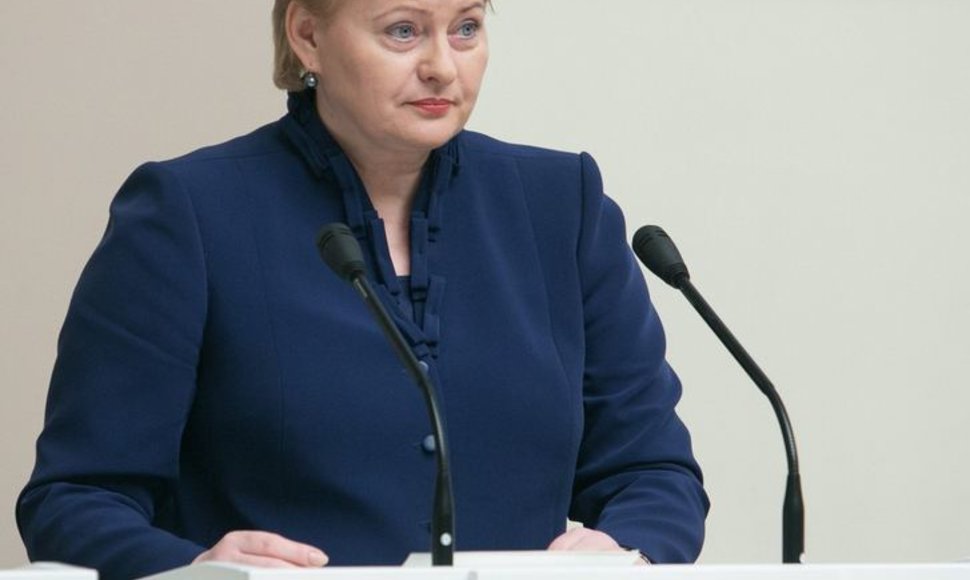One of the main speakers in the advertised show was Zigmas Vaišvila, who, for a few months in 1991-1992, was the director general of the Lithuanian State Security Department.
However, on the evening of 22 November, Janutienė and the TV3 viewers got a surprise: Lithuanian TV3 repeated Janutienė’s show from the previous week instead of broadcasting the earlier advertised show on the new facts in Grybauskaitė’s biography. Janutienė described the behavior of TV3 as an act of censorship and “the return to Brezhnev’s era.” The TV3 administration stated that Janutienė’s documentary on Grybauskaitė was not ethical enough because it was biased and did not present the opinion of the other side.
In fact, all the shows by Janutienė are pretty biased and angry; however, only this one was banned. The censorship can only be limited in these times – already the next day Janutienė’s banned documentary was available to watch on Internet news sites.
 |
| Tomo Urbelionio/BFL nuotr./Zigmas Vaišvila |
It presented not many new facts for those who are interested in Grybauskaitė’s biography. Vaišvila, with anger on his face, explained that Grybauskaitė, due to her career as an academic in the Moscow-financed school for communist nomenclature, remained a member of the Communist Party of the Soviet Union after 1989, when the absolute majority of Lithuanian communists left this party to join the newly-created independent Lithuanian Communist Party, which was led by Algirdas Brazauskas. According to Vaišvila, Grybauskaitė stayed in the Communist Party of the Soviet Union at least for a month, even after 11 March 1990 when the declaration of the re-establishment of Lithuania’s independence was announced.
In 2009, during the presidential election campaign, Vaišvila published the same information on balsas.lt (this Internet site, according to speculation from other media, is indirectly under the financial control of Viktor Uspaskich, the leader of the Labor Party). The biographical facts, presented by Vaišvila, are now obviously unpleasant for Grybauskaitė and these facts from her biography say a lot about the hypocritical attitudes of her main supporter, the Homeland Union – Lithuanian Christian Democrats, which is usually extremely cautious regarding politicians with a communist past. However, during the presidential elections in 2009, the electorate decided that the former communist careerism of Grybauskaitė was not such a big sin.
 |
| Viganto Ovadnevo nuotr./Rūta Janutienė |
Since 2009, the opinion polls’ ratings of Grybauskaitė, despite some controversy over her past, topped the charts, non-stop, with a constant positive approval of over 70 percent of Lithuania’s population. Only now, when Grybauskaitė started to ignore the electorate’s choices, i.e. the vote against the new Visaginas nuclear plant in the recent referendum and the massive support for the Labor Party in the recent parliamentary elections, did her approval rating drop significantly, by 14 percentage points, from 73 percent positive approval in October to 59 percent in November, according to the survey conducted by the Vilmorus company which was published in the Lietuvos Rytas daily on 24 November.
Anyway, Grybauskaitė remains the most popular Lithuanian politician. So, maybe Grybauskaitė is too nervous about the media. All the main Lithuanian media analysts came to the conclusion that TV3 banned Janutienė’s documentary due to pressure from Grybauskaitė or due to its fear of such pressure. During the rule of previous Lithuanian presidents, such censorship was unimaginable.
The first wife of Grybauskaitė’s father, talking, during that banned show, in her house in the town of Šeduva, said she was warned “by Dalia” via Grybauskaitė’s cousin about the arrival of the TV crew. Janutiene made the conclusion that somebody could have read her email or listened in on her phone call regarding the plans of her TV crew. On 25 November, the appointed Lithuanian PM Algirdas Butkevičius told the media that the suspicions about journalists being observed by the secret services should be investigated and such speculation or practices, if they really take place, should be stopped. Let’s hope so.
Update 29 November
Lithuania's commercial television TV3 has announced on Thursday it is terminating its contract with journalist and editor Rūta Janutienė.
The television said in a communiqué to BNS that the dismissal was due to difference in attitudes about the quality of Janutienė's work.
"We regret to inform that the attitudes held by Rūta and the television towards ethics and the quality of journalistic work have split – a path of conspiracy theories was chosen instead of dialogue and self-improvement. We categorically deny any speculations that may occur on this topic – TV3 seeks to provide its viewers with high-quality broadcasts, it is not involved in any political campaigns and has always supported free speech. We are convinced that even journalists who deem themselves to be the best of all should abide by the law, ethics standards, seek self-improvement, and avoid bias," TV3 said in a comment to BNS.
According to the communiqué, over the past several years, various journalistic self-regulation institutions, state institutions, and courts have found Janutienė's coverages in violation of laws or ethics standards on more than five occasions.












